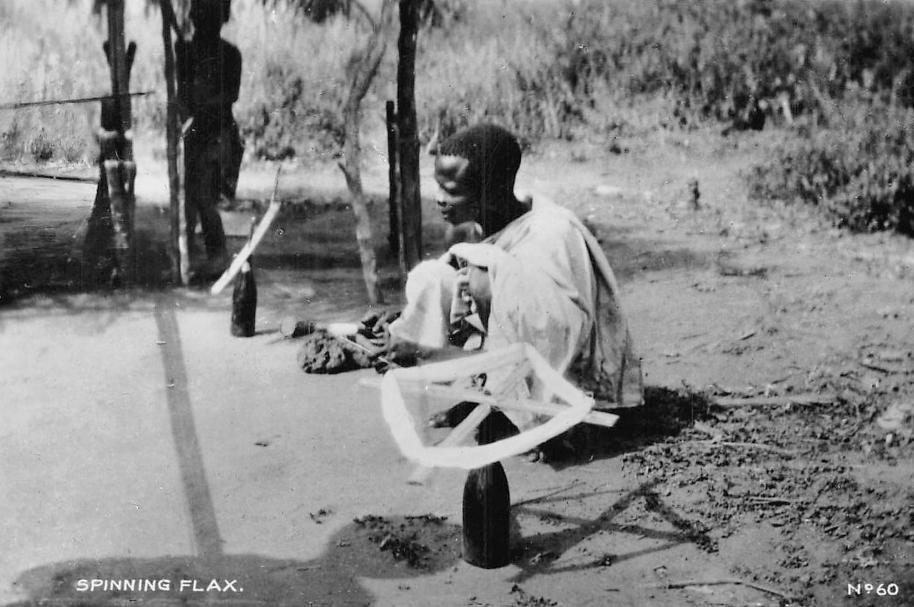
Ghana: Economy

Figure 1.--This colonial era postcard was probably taken about 1950. A youth is shown spinning flac thread. Handicraft industries like this declined during the colonial era. Ghandi in India considered it one of the evils of colonialism. In fact the only hope tht Africans and Asians had of developing modern economies providing properous lives to the population was to make the transition from artisan and handicraft activities to modern production methods.
|
|
There appears to have been maitime commerce with the Meditwrranean world during the ancient world with the Phonedians and Carthage. This was, however, limited and the Sahara was a formibavle barrier to trade. This only chnged with the introduction of the camnmel, allowung the development of trans-Saharan caravan (3rd century AD).
The earliest known indigenous African empire was Ghana covering a large area of sub-Saharan West Africa beyond the boundaries of the modern country which bears its name. The origins of the Ghanian Empire are murky. It is known to have existed by the 4th century AD, but its origins probably pre-date the Christian era. The Arabs thus encountered a well-established African civilization in West Africa. The economy was built on agriculture, including gardents and date groves. Sheep and cattle were also raised. The agricultural economy was affected over time by droughts. Here the climate change appears to have been a factor. Trading was also important to the economy and the primary trading partner was with the north. In antiquity this meant the Roman Empire. After the fall of Rome this meant the Vandal kingdom of North Africa and than the Arabs who conquered North Africa. The most important town was Kumbi-Kumbi. Islamc gradually was accepted by the people and was pronounced by the 10th century. The Arab influence benefitted the economy and this allowed the Empire to expand. The Tunka converted to Islam (11th century). The increased power of the Empire was able to impose control over the trade routes. Ghana imported wheat, fruit, sugar, brass, pearls, and salt. They exported rubber, ivory, slaves, and gold. The Empire reached the peak of its power during the Sisse dynasty. A fanatical Muslim group, the Almoravides invaded the Empire (1076). They captured Kumbi-Kumbi and killed those who refused to convert to Islam. The ensuing religious strife and droughts resulted in the decline of the Empire (late-11th century). Invaders destroyed the Empire (12th-13th centuries). [Franlin, pp. 11-13.] The area of modern Ghana continued to be involved in long-distance trade, here gold was a powerful factor. The trans-Saharan trade, one of the most extensive trading networks before the Europen maritime outreach. European, North African, and Saharan commodities were taken southward and exchange for the products of the African savannas and forests, this included gold, kola nuts, and slaves. The trans-saharan trade was largely displaced by the arrival of Europeans and the beginning of maritime trade.
What is now Ghana, was named the Gold Coast by the European traders. The area was an important source of the gold traded across the Sahara and this continued to be vimportant with the Europeans maritime traders. Impotant tribes like the Asante achieved a degree od centralized organization. They controlled gold prices by regulating production and marketing. Portuguese and later Dutch and English traders effectively circumvent the Saharan trade by sailing directly to its southernmost source on the West African coast (15th century). Pepper and ivory were other importt commodities.
HBC

Navigate the Boys' Historical Clothing Web Site:
[Introduction]
[Activities]
[Biographies]
[Chronology]
[Cloth and textiles]
[Clothing styles]
[Countries]
[Topics]
[Bibliographies]
[Contributions]
[FAQs]
[Glossaries]
[Images]
[Links]
[Registration]
[Tools]
[Boys' Clothing Home]
Navigate the Boys' Historical Clothing national pages:
[Return to the Main Ghana page]
[Return to the Main African country page]
[Return to the Main African country economics page]
[Return to the Main African page]
[Angola]
[Burkina Faso]
[Cape Verde Islands]
[Democratic Republic of the Congo]
[Ethiopia]
[Gabon]
[Ivory Coast]
[Lessotho]
[Madagascar]
[Mali]
[Somalia]
[South Africa]
[Togo]
[Uganda]
Created: 2:21 AM 6/12/2014
Last updated: 2:21 AM 6/12/2014



